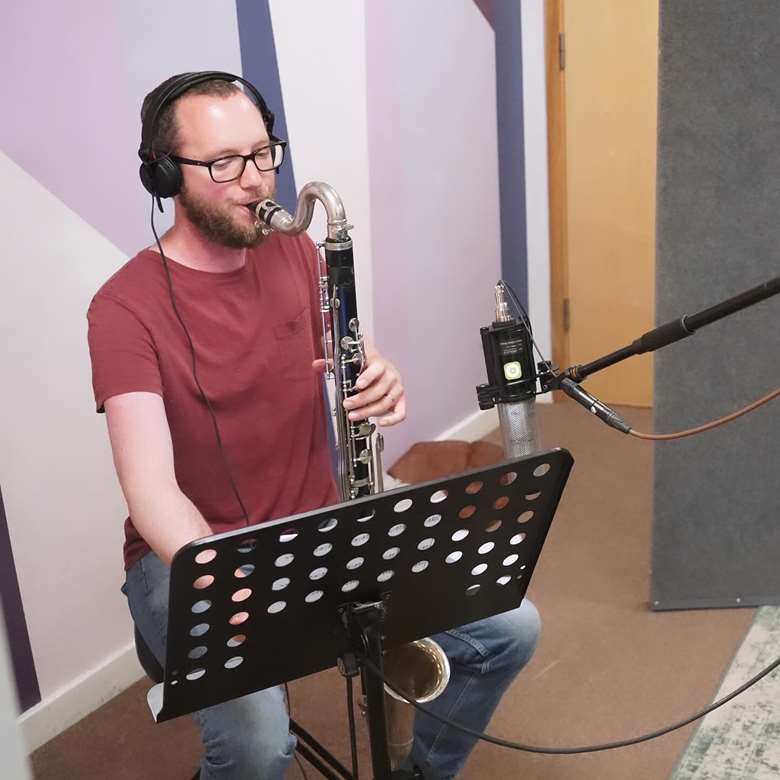Taking off: Rob Cope
Friday, May 31, 2024
Saxophonist/clarinettist Robe Cope is on a journey to merge traditional musical storytelling with his avant-garde influences. Tom Spargo jumps on board and goes along for the ride

I never thought I could do anything as good as Gods of Apollo. So Gemini seemed like a real miracle when it came”.
Rob Cope is a soprano saxophonist and bass clarinettist based near Manchester. His first record on Ubuntu Music was titled after the 1960s US Apollo space programme and featured experimental saxophone improvisation over sampled spoken audio from the NASA archives. Five years later, the title of his recently released album Gemini continues this association with the Cold War space race while also signalling the ancient Greek word for ‘twins’. This reflects the unique format of his four-piece ensemble, which is viewed better as two coexisting duos rather than a traditional jazz quartet.
The first duo is comprised of Cope alongside tenor saxophonist Andy Scott, his former teacher who he first met aged just 10 years old. After Cope developed Hodgkin's Lymphoma at 18, Scott played a crucial role in championing and nurturing his musical talents at music college.
Scott has since remained a close mentor, and all the saxophone duets on Gemini were written explicitly for him. The ensemble is completed by the second duo of Liam Noble on piano and Paul Clarvis on drums, two veterans of the UK jazz scene. “This line-up is working better than I could have ever imagined” explained Cope, “I feel like I've woken a beast”.
Cope originally studied contemporary classical saxophone at the Royal Northern College of Music. However, his musical trajectory changed significantly upon meeting tenor legend Chris Potter in his third year. “That just changed my whole life. I sold my tenor and bought a 1958 Mark VI. I knew I wanted to go to London to study jazz”.
Cope went on to complete a two-year jazz saxophone Masters at the Royal Academy of Music. This grounding in both jazz and classical genres gives his music a unique, multi-layered quality: “I want to write music that is suited to someone with my training, who's improvised a lot, but also read a lot.”
His music walks a tightrope between heavily written and heavily improvised. “When the improvised bits happen, all the good stuff happens. And the written bit – that’s just a vehicle to get there.”
Cope lights up when explaining his obsession with storytelling. Gemini’s title track is undeniably autobiographical: “'Gemini' was a story of starting out very notated and classical. Then I used some extended techniques like multi-phonics and a soprano cadenza as a way to lead into a solo – like a mini life story. It basically ends up as a love letter to Chris Potter.”
The track ‘Together’ similarly narrates the story of a student-teacher relationship, with two melodic lines that begin in unison, until they diverge: “I tried to explain this bittersweet parting of ways. You teach somebody everything you know, and then you let them go off into the world.”
In April, Cope will be releasing a book of advanced saxophone duets containing solo transcriptions for each track on Gemini. He speaks openly about the profound impact that his students have on his music and recalls numerous instances in which open-minded discussions with young musicians have influenced the finished form of his compositions.
“Music is such an enormous family tree," he says. "I love this idea of the torch being passed from teacher to student, who eventually becomes the master.”
Cope is an encyclopaedia of jazz influences. Key inspirations include guitarist Pat Metheny, the late trumpeter Richard Turner, minimalist composer Steve Reich, and pianist Gwilym Simcock, who was a few years above Cope at school.
“Michael Brecker was my whole life at college – I was obsessed”, he says.Alongside performing and teaching, Cope now hosts The Jazz Podcast: “It’s like weekly being snowed in with new music. But it's great because even if I don't go looking for it, music finds me, which is a wonderful thing. I'd love to be really good at tenor – that's my favourite sound” he jokes, “but what I want and what I am are two separate things”.
Soprano is where Cope feels most able to express himself. He describes it as the “nexus” of the saxophone, the hardest one to master. “My soprano has quite an unusual quality to the sound – I can't make any other saxes sound like that”. Cope remains a multi-instrumentalist at heart and describes taking up the bass clarinet in his early 20s as “love at first sight”.
Cope hinted at the title Mercury for his next project, after the spaceflight programme that preceded both Apollo and Gemini. However, this may be some years in the making: “I’ll have to wait until I've listened to about three years of music, until all those influences get to boiling point, until all the ideas are fully formed.” Whatever form this third album takes, it will undoubtably be one to watch out for.
This article originally appeared in the May 2024 issue of Jazzwise. Never miss an issue – subscribe today





